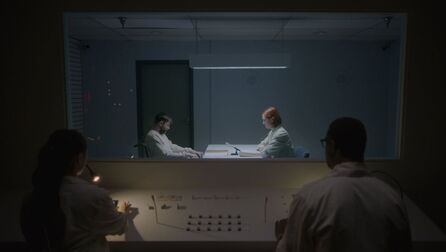 Have you ever watched a film that is so profoundly confusing, that you actually feel dumber having watched it…? …To the detriment of my mind, this was unfortunately my experience with director Rob Schroeder’s Ultrasound, which just premiered at Tribeca. Written by Conor Stechschulte, this doozy of a mind-warp is so complex, that for the first time in my years of film journalism, I’m not even quite sure how to provide a synopsis without spoiling it, so let’s just say this: after his car breaks down in the middle of nowhere, Glen (Vincent Kartheiser) shelters with Art (Bob Stephenson) and his wife Cindy (Chelsea Lopez). The awkward encounter quickly turns a whole lot stranger after Art asks Glen to sleep with his wife. Score. Soon, Cindy is pregnant, and she and Glen find themselves involved in some kind of research that to say anything more would ruin the experience. Besides, I’m not sure how much sense of it I could make if I tried. There is nothing wrong with a film being “complicated”, and what was a difficult experience for myself may be more enjoyable for others. The problem with Ultrasound is that it is just so damn alienating to the audience, that those willing to give the film time may find themselves giving up by the midway point. Opening on Glen driving through the storm and set to a melancholic score by Zak Engel, Ultrasound starts off strong. Schroeder invites us into an uncomfortable situation bristling with tension that had me giddy with excitement. What is with this couple? Why is Art asking Glen to sleep with his wife? How soon before Glen finds himself chained to the bed and part of some kind of satanic baby ritual? There’s an eerie patience in this first sequence, with Bobby Barito’s skillful sound design barraging the audience with strange frequencies that burrow deep under the skin. Schroeder also introduces an unsettling element in which time and space are unwilling to be pinned down and made sense of. Glen finds himself sitting at the kitchen table, then suddenly at the counter, Cindy present and then not. Is it an effect from hitting his head during the accident, or something more sinister? These sudden jump cuts are present all throughout Ultrasound and create a highly disorienting effect that works wonderfully to enhance the confusion of the situation and raise the tension as we, like Glen, attempt to understand what the hell is going on. The strength of the opening is what makes the rest of Ultrasound feel like such a disappointment. From there, we’re suddenly off on different threads of the story, in which time and space are virtually non-existent. We meet Katie (Rainey Qualley), who is pregnant in one moment and not in the next. She’s married to slimy, “it’s all the fake news media’s fault” politician, Alex (Chris Gartin). And then there’s Shannon (Breeda Wool), a scientist working with Dr. Conners (Tunde Adebimpe) on a project involving all of the above, which we won’t learn a single detail about until around an hour in. Seriously. I mentioned that Ultrasound is alienating, and that’s because it leaves the audience completely in the dark for more than half the runtime. As viewers, we don’t need to know exactly what’s going on, and films are better when we’re not three steps ahead of the characters. But, in an effort to keep the twist a secret for as long as possible, Ultrasound doesn’t even give us the proper character motivations to at least let us in on who these people are. We meet Shannon and Dr. Conners acting out a script of dialogue which other characters have previously said, with zero clue as to why, and if that sounds weird, that’s nothing compared to what comes later. The strangeness of it all coupled with the quite literally forced dialogue does nothing to help the actors, and results in scene after scene of awkward discomfort. The cast often seems just as confused with their roles as we are, and, I suppose fitting to the presentation, nothing feels real, including the people. Engel’s score and Barito’s sound design work overtime to maintain interest in the creep factor of the whole thing, but, outside of an engaging performance from Stephenson, that’s about all Ultrasound has going for it. Ultrasound isn’t a slow burn. It’s more like watching bread mold. This film moves at a crawl, turning off all of the lights and letting us move around in the darkness, bumping into this and that before someone finally turns on the light, but by that point, you’re much too frustrated to care. To the film’s credit, the reveal in Ultrasound is itself fascinating, and should provide plenty of re-watch value for those engaged enough to give the film another go. I just wonder if it may work better as a novel, where we could at least be inside the character’s minds and get a deeper understanding of them, because so very little is provided in the film for the audience to latch onto. Unique as the concept may be, Ultrasound is an off-putting, head-scratcher of a sci-fi “thriller” that insists on keeping the audience at arm’s length rather than welcoming them in. It’s juggling far too many eggs, and ultimately ends up with yolk all over its face for the effort. “I can’t figure out what’s going on,” mutters Glen midway through. I feel you, Glen. I feel you. By Matt Konopka
0 Comments
Leave a Reply. |
Archives
March 2023
|

 RSS Feed
RSS Feed